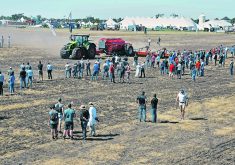Companies in Canada’s grain industry likely have the legal right to mandate vaccinations for their workers, as long as the policy and procedures are done properly, says the leader of the Grain and General Services Union.
The federal government has proposed a vaccine mandate for federally regulated workplaces, which would include grain elevators across Canada.
The Grain and General Services Union represents workers at Viterra and Richardson grain elevators in Saskatchewan, as well as editorial staff members at The Western Producer.
Hugh Wagner, GSU general secretary, said such companies could mandate vaccines for workers, if it’s done the right way.
Read Also

Using artificial intelligence in agriculture starts with the right data
Good data is critical as the agriculture sector increasingly adopts new AI technology to drive efficiency, sustainability and trust across all levels of the value chain.
“The advice we’ve been giving members… provided it (the policy) is laid out clearly and implemented properly with proper notice and advice on how to comply, the consequences for not complying, sufficient notice and all of that, then our reading of the law as it’s evolved so far, is that an employer can probably do that,” Wagner said.
“Whereas it’s part of a publicly mandated health policy, if it’s an occupational health and safety regulation … I’m even more certain that an employer can do that.”
Wagner, though, doesn’t know how many GSU members would be affected by such a policy. The union doesn’t have statistics on the percentage of members who are vaccinated.
“But anecdotally, it’s fairly high and consistent with the general population,” he said.
The federal government was expected to introduce the vaccine policy this winter, but it may take longer than expected because federal regulations don’t change overnight.
“That… is a fairly time-consuming process. So, I don’t see anything happening, concretely, before the spring,” Wagner said. “But government could always surprise… and move quickly.”
Even if the government introduced the mandate in late February or early March, the policy wouldn’t take full effect until the spring because unvaccinated workers need time to get two jabs.
“They would have to give a period of time to acquire first and second doses and perhaps third, within the timeframe recommended by health authorities,” Wagner said.
For now, GSU is waiting on details of the potential mandate and what it could mean for union members.
“The union hasn’t taken a position (on a vaccine requirement), one way or the other,” Wagner said. “We will evaluate whatever the employer policy is and advise our members as to their rights and responsibilities, in response to that (policy).”
















